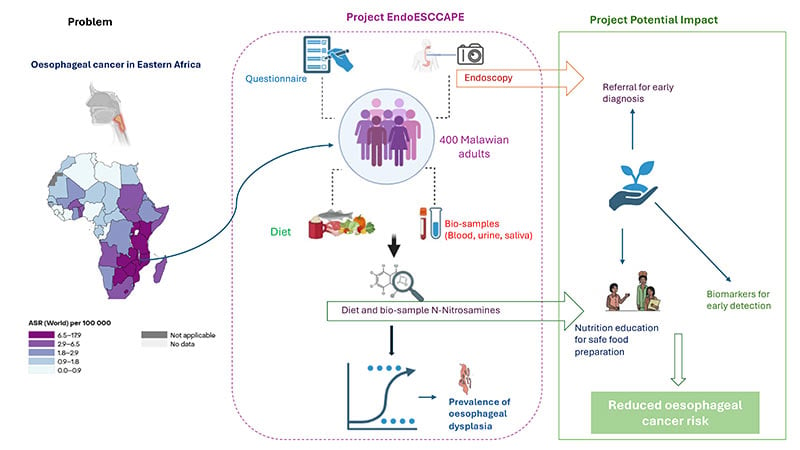Grant title: Diet, N-nitrosamines and oesophageal squamous cell carcinoma precursors in the African Esophageal Cancer Corridor: EndoSCCAPE – a community-based cross-sectional study in Malawi
Institution: International Agency for Research on Cancer
Grant awarded: September 2025
The Malawi-IARC team leading this study are extremely grateful for Wereld Kanker Onderzoek Fonds and World Cancer Research Fund International support to this study of oesophageal cancer in Malawi. We have many unanswered questions about this cancer in east Africa, especially when it occurs in patients who have never drunk nor smoked, and the present study will be a first in Blantyre to look at precursors to the disease. Thank you! – Dr Valerie McCormack
Background
Oesophageal cancer (cancer of the food pipe) is a commonly diagnosed cancer in east Africa, with Malawi having the world’s highest incidence rates. From 2017 to 2020, our team conducted multiple oesophageal cancer studies in this setting, yielding valuable insights.
However, we were unable to measure dietary biomarkers for causal research in oesophageal cancer patients because, by the time of diagnosis, they often modify their diet to accommodate the difficulty in swallowing owing to a blocked oesophagus. To overcome this limitation, we propose studying precursors to oesophageal cancer – these are cellular changes in the oesophagus that come before cancer development and can be detected through an endoscopy (a procedure inserting a camera into the oesophagus).
N-nitrosamines are a class of chemicals known to include established carcinogens, some of which are of particular concern. N-nitrosamines can be introduced into the body via food, water or saliva. In Malawi, potential sources of these compounds include:
- fish (dried, salted), pickled and fermented foods (eg thobwa (cereal milk), chibuku (cereal-based alcohol), cassava flour);
- drinking water, where N-nitrosamines may form from pesticide nitrates reacting with compounds that have seeped out from human and animal urine.
Aims and objectives
Our primary goal is to investigate the determinants of oesophageal cancer precursors among older adults in Malawi, with an initial focus on N-nitrosamine exposure. Our specific objectives are:
- to establish a biological samples and questionnaire resource;
- to assess the prevalence of oesophageal cancer and its precursors, and identify associated risk factors, including N-nitrosamines;
- to examine whether consumers of alcohol and very hot beverages have a particularly high risk of oesophageal cancer precursors when also exposed to N-nitrosamines;
- to investigate the determinants of N-nitrosamines in the urine and measure N-nitrosamine levels in suspected high-risk foods (eg salted and fermented products).
How it will be done
We will conduct a community-based study in Malawi, recruiting 400 participants, ensuring equal representation by sex and urban/rural residence. To focus on individuals with sufficient lifetime exposure to potential risk factors, we will restrict participation to adults aged 50–69 years.
Each participant will be asked to:
- provide urine, saliva, and blood samples;
- complete a detailed dietary and lifestyle questionnaire;
- undergo endoscopy for the detection of oesophageal cancer precursors.
N-Nitrosamine levels will be measured in urine samples and food extracts using state-of-the-art analytical techniques at IARC laboratories.

Created by Dr Valerie McCormack, IARC
Potential impact
By identifying key risk factors for oesophageal cancer precursors, including N-nitrosamines, this study will help develop targeted prevention strategies. These may include lifestyle modifications, improved food preparation methods, and dietary recommendations aimed at reducing oesophageal cancer risk. If specific N-nitrosamine-containing foods are identified as high risk, interventions will focus on reducing their consumption in affected communities.
